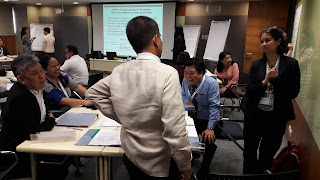(IMAESCII516) Article Review 3: 'Piaget’s Constructivism and Adult Learning' (2011)
Article Reviewed:
Peter Jarvis, and Mary Watts, eds. 2011. The Routledge International Handbook of Learning/ Taylor & Francis Group (2011). ProQuest Ebook Central. http://ebookcentral.proquest.com/lib/gla/detail.action?docID=978902
Book Chapter: Bourgeois, Etienne. “Piaget’s Constructivism and Adult Learning”
The paper presented Piaget’s definition of ‘constructivism’ which is derived mainly based on interactions by individuals and are driven by their thoughts, biases, and perceptions throughout the interaction process. The information and knowledge gained from these interactions were then institutionalized over time. Similarly, relationships mature in these interactions.
In the process of recognizing the validity of the cognitive schema formed in a person’s mentality, there will be 'cognitive conflicts' caused by disruptions over new knowledge and information. These disruptions may dissipate the strength of the earlier knowledge formed by the person. As such, the article also outlined ways to resolve this cognitive threat, either by sustaining the status quo or by accommodating it, and therefore transforming the learner with the acquisition of new learning.
This is where the ‘individual vs social learning’ debate has been contested by the likes of Vygotsky who argued that learning is influenced by social and cultural interactions (1). This debate presents the reader with ways to look at the epistemological challenges of constructivist concept based on different vantage points: individual, team, and organisations. Another debate presented in the chapter was on learner’s engagement in learning. Piaget did not focus on the origins of learner’s social engagement with the learning ecosystem, but rather emphasized how individual’s cognitive abilities are expanded in the process.
Overall, the perspectives
and debates presented in the chapter showed that ‘constructivism’ has indeed been
defined differently by scholars. I would recommend that readers need to be consciously aware of these
contested angles not only in the constructivist theory, but also in the other theories of
learning.
Notes:
(1) A simplified explanation of the debate between Piaget and Vygotsky can be read from this link.

.jpg)
Comments